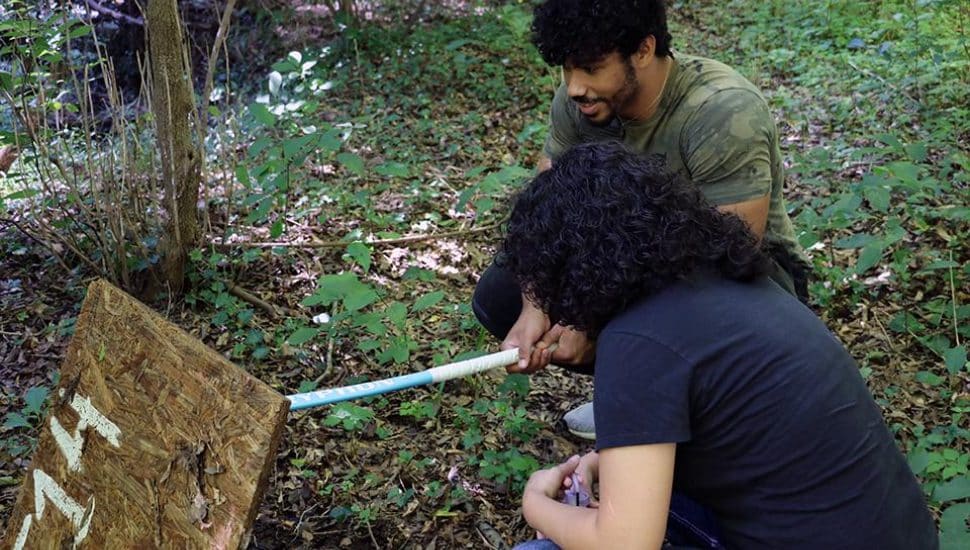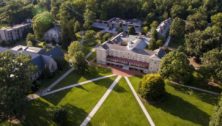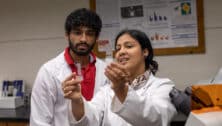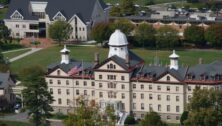Here’s How These Widener Students Spent Their Summer Vacations

From robotics and artificial intelligence to the impact of COVID-19 on different demographics, the research and other work tackled by Widener undergraduates this past summer was as varied as it was timely and relevant.
More than 60 students partnered with faculty advisors through the annual Summer Undergraduate Research & Creative Activities (SURCA) program.
Students from across academic disciplines had an opportunity to apply what they’ve learned in the classroom to real-life, hands-on projects through Widener’s SURCA program.
Students also had a chance to talk about their new projects in a presentation during the 14th annual SURCA Symposium on Sept. 22 on the Chester campus.
Here are some of the summer projects students had a chance to explore in Widener’s SURCA program:
Local and Global Biodiversity
Biology majors Luigi Quierolo ’25 and Alexa Ruberte ’25 spent time at the Taylor Arboretum in Chester seeking out different reptile and amphibian species and to see what impact urbanization has had on species variety.
“There are urbanophobic reptiles and amphibians that won’t thrive in urban environments, but there are also urbanophilic species that do thrive, so it can be positive on those types,” Ruberte explained.
The pair were expanding on research by their faculty mentor, Bruce Grant, Widener’s chairman of biology. The research focused on identifying reptile species that may have moved due to urbanization from Philadelphia, Los Angeles, and Quierolo’s home city of Peru.
Does a Scandinavian Prison Model Work in America?
Zoe Sweet ’25 wasn’t expecting to spend time in prison interviewing incarcerated individuals, but after taking an English class with Associate Professor Jayne Thompson her freshman year, Sweet became intrigued by the student-prisoner classes Thompson was teaching.
“I was a little worried. There are so many negative connotations embedded in your mind about prisons,” said Sweet, a political science and English major. “But all that went out the door. As you sit down with them, it’s amazing.”
For her SURCA project, Sweet looked at State Correctional Institution (SCI) – Chester, which is experimenting with modeling part of its facility after prisons in Sweden and Norway, utilizing a wing of the prison known as “Little Scandinavia.”
The Scandinavian model highlights treating prisoners as humans and growing from their mistakes, leading to rehabilitation. It includes housing prisoners in individual cells, having an open lobby area, and a kitchen to cook and buy food.
“I hope this is the next step [for the American prison system],” said Sweet.
An aspiring judge, Sweet interviewed those living and working in “Little Scandinavia” and plans to publish her findings.
Advocating for Easier Access to Feminine Hygiene Products & Condoms
Ja’Lisa Williams, ’24, as treasurer of the Widener Residence Hall Association, was attending a residence life conference at Kent State University in Ohio.
During a bathroom trip, she saw a feminine hygiene and condom dispenser with available free products.
The marketing major wondered if Widener could start the same thing.
Many college students don’t always have money for hygiene products, while others are too shy or embarrassed to buy the items in a store. Members of the LGBTQ+ community may deal with additional concerns.
For her SURCA project, Williams began researching the issues, including why so many college students have unprotected sex.
She is developing a Widener survey to gauge interest in installing a bathroom dispenser.
She’s also working with campus partners to get the dispensers installed.
“No matter how much (feminine hygiene or sex) is talked about, we’re still uncomfortable. This is designed to get rid of that,” said Williams.
Mastering the Game with AI
Nick Chaves ’24, a computer science major, took his childhood game Qwirkle and brought it to the college level by bringing in artificial intelligence (AI).
Getting AI to learn and play Qwirkle has never been done before.
Chaves sought the advice of Edwin Dauber, a Widener assistant professor of computer science, and built an AI that could learn and win the game using image recognition and simulated play.
“The user can take a photo of the game, and the AI recognizes all of the piece tiles and the board configuration,” Chaves explained.
The AI learns through self-play.
“And the cool part is you don’t need to put any prior knowledge into the AI. It develops its own strategy to play the game,” Chaves said.
He hopes to eventually create a Qwirkle app or website utilizing the AI.
Learn more about Widener’s SURCA program and about the university.
Join Our Community
Never miss a Delaware County story!
"*" indicates required fields























![95000-1023_ACJ_BannerAd[1]](https://delco.today/wp-content/uploads/sites/3/2023/03/95000-1023_ACJ_BannerAd1.jpg)









